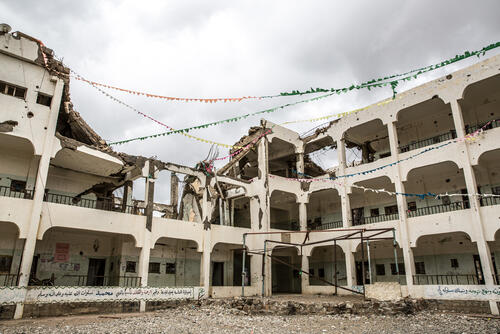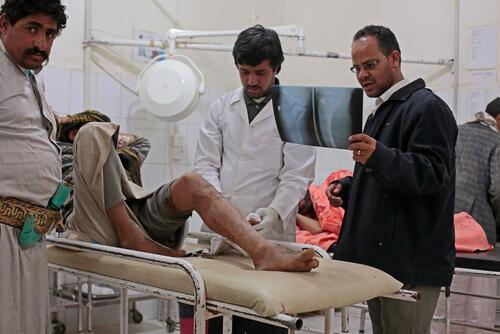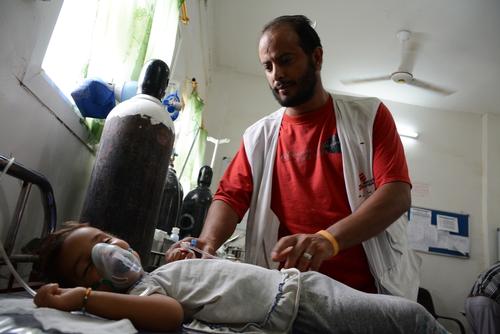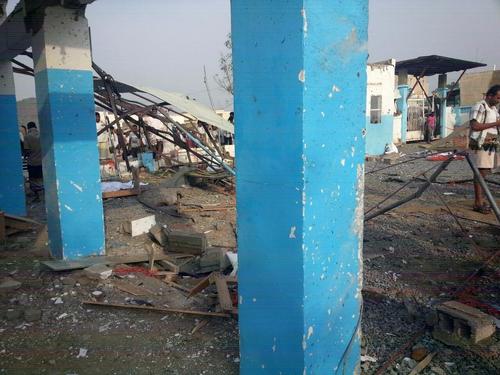Overview
- On 10 January 2016, the MSF-supported Shiara hospital in Razeh, Saada Province, near the border with Saudi Arabia, was hit by a projectile, killing six and injuring seven. This follows two other such incidents against MSF health facilities in Yemen: one in Haydan, Saada province on 26 October 2015, and another on an MSF tented clinic in Houban, Taiz governorate, on 2 December 2015. MSF has called for an independent investigation into the Razeh incident by the International Humanitarian Fact-Finding Commission.
- In mid-January 2016, MSF teams gained access to the besieged enclave of Taiz, delivering 15 tonnes of essential medical supplies – the first such delivery since August 2015.
- On 21 January 2016, an ambulance driver working with an MSF-supported ambulance service was hit in an airstrike and killed in Saada governorate. Five patients were killed in the same impact.

At the end of January:
- More than 31,000 war wounded have been treated by MSF teams since March 2015
- Nearly 11,000 surgeries have been carried out
- Nearly 38,000 displaced people have received free medical consultations from MSF staff
- More than 8000 women have given birth in MSF facilities
- More than 108,000 patients have been seen in the emergency room (ER)
- More than 860 tonnes of medical supplies have been sent to Yemen
Project updates
MSF is carrying out activities in or supporting 11 hospitals and health centres, and is providing support to another 18 hospitals or health centres in eight governorates: Aden, Al-Dhale’, Taiz, Saada, Amran, Hajjah, Ibb and Sana’a governorates.
A total of 2,102 MSF staff are currently working in Yemen – 97 international staff and 2,005 Yemeni staff – making it among MSF´s largest missions in terms of personnel.
Aden
Aden is currently dominated by Southern Resistance Forces, backed by the military coalition led by Saudi Arabia, but the situation is volatile.
MSF is running an Emergency Trauma Centre (74 beds) in Sheikh Othman district, in the north of the city. The hospital provides free medical care in an emergency room (ER), a hospitalisation ward and two operating theatres and an intensive care unit, and provides mental health and physiotherapy consultations.
MSF has been supporting Ibn Khaldoun Hospital in Lahj with regular donations of medical supplies since December 2015.
Amran
The situation North Amran governorate is relatively calm, despite regular attacks in the north; as a result people are fleeing the conflict to settle in this area. MSF has been providing general consultations to displaced people in mobile clinics.
MSF is supporting Al-Salam hospital (104 beds) and Huth health centre (15 beds) in healthcare provision, donations of medication, oxygen, logistical equipment, electricity, human resources and a referral system.
In the north of Amran governorate, MSF is supporting the emergency room, the maternity and the ambulance referral system to Al-Salam hospital in Khamir, as well as the sterilisation room and the rehabilitation of structures in the Harf Sufyan, Al-Ashah and Al-Qalfah health centres.
Assistance is being provided to Internally Displaced People (IDPs) through mobile clinic consultations, distributions of household kits and water and sanitation activities in Khamir and Huth districts.
Sa'ada
As intense fighting and bombing continues in Saada governorate, the MSF-supported Al Jumhori hospital, in Saada city, is receiving increasing numbers of war-affected patients. In response, the teams have increased the hospital´s bed capacity. The last week of January, they dealt with two separate mass casualty situations following a series of airstrikes. During two incidents, 17 and 40 wounded patients were brought in to hospital. An ambulance driver working with MSF was among the victims. The number of babies born in the hospital continues to increase, reaching more than 100 deliveries per week.
The MSF-supported Shiara Medical Centre, Razeh district, was hit with a projectile on 10 January 2016. Six people were killed and seven injured. The medical centre had been hit previously in September before MSF began working there in November 2015. The facility is open and operational at present. MSF is providing assistance in the emergency room and in the maternity department, as well as organising referrals to Al-Jumhori reference hospital in Saada city.
A distribution providing essential household items (soap, blankets, cooking utensils, for example) was carried out in early February to 340 families in need in the remote district of Kitaf, bordering Saudi Arabia. Medical kits have also been donated to two health centres. Generally speaking, displaced people in Kitaf have fled due to the intensity of the conflict and are living in very precarious conditions, with some families living in caves. The Haydan Health Centre, which was struck in an airstrike on 26 October 2015, has resumed some activities.
MSF repaired the staff accommodation room and re-opened an emergency room there in late December.
Hajjah
Though the security situation in Hajjah city has been relatively calm, war wounded people continue to arrive to at the MSF-supported Al-Jamoorhi hospital from the front line area.
In the IDP camps of Abs district MSF is supplying drinking water to 16,000 people, installing bladders and regularly supplying water to meet minimum humanitarian standards in the camps. Through a system of mobile clinics, MSF teams are also providing basic medical care to people as well as monitoring the nutritional situation.
In Abs Hospital MSF is supporting all services except the outpatient department (OPD). The teams have received many people wounded in intense shelling and fighting in parts of the governorate. The increasing number of deliveries has pushed MSF to extend the maternity services within the hospital. Paediatric care is also being provided to children under 15.
Sana’a
In view of the recent airstrikes in and around Sanaa, MSF recently donated 60 dressing kits to Al Jumhori and Al-Thawra hospitals, the main hospitals in Saana, which are receiving referrals from peripheral hospitals as well as direct victims of the airstrikes in the city. MSF is also supporting directly the ER of the University Hospital in Al Koweit, and will extend its support to the surgical wards. The proximity to the front line has brought on increasing numbers of war-wounded patients.
MSF´s support to the Ministry of Health´s HIV programme in Saana continues as normal, with 97% of the programme´s 1,300 patients receiving their life-saving anti-retroviral treatment despite the tensions and violence in the city.
Al-Dhale
In Al Dhale governorate, MSF´s support continues to health facilities in Al Dhale, Qataba and Al Azarik.
MSF activities in Al Dhale include support to the emergency room, outpatient consultations, surgeries, inpatient services, patient referrals, and reproductive health, spread over the three sites. Just in January, a total of 5,000 outpatient and emergency room consultations were carried out by the teams in Al Dhale.
Taiz
After five months of intense negotiations, on 16 January MSF was able to get a delivery of two trucks full of essential medical supplies into the besieged area of the city of Taiz. Checkpoints and intense fighting have hampered humanitarian aid from reaching the enclave since August 2015, which was the last time that hospitals in the area had received medical supplies in any quantity. Severe shortages meant that wound care and surgery had to be stopped on a number of occasions. Up to mid-January 2016, the MSF team in Taiz had treated had more than 5,300 war-wounded people.
In November 2015 MSF opened the Mother and Child Hospital in El Hoban, services includes emergency room, OPD under 10 years, Reproductive Health and patient referrals. Up the end of January the teams had carried out 8,198 consultations and 146 deliveries.
Ibb
MSF took over the management of the Emergency Room in Al Thawara Referral Hospital in Ibb in February 2016. Since then, the staff has been seeing from 600 to 800 patients a week, 15 to 20 per cent of them for violent trauma related injuries.






